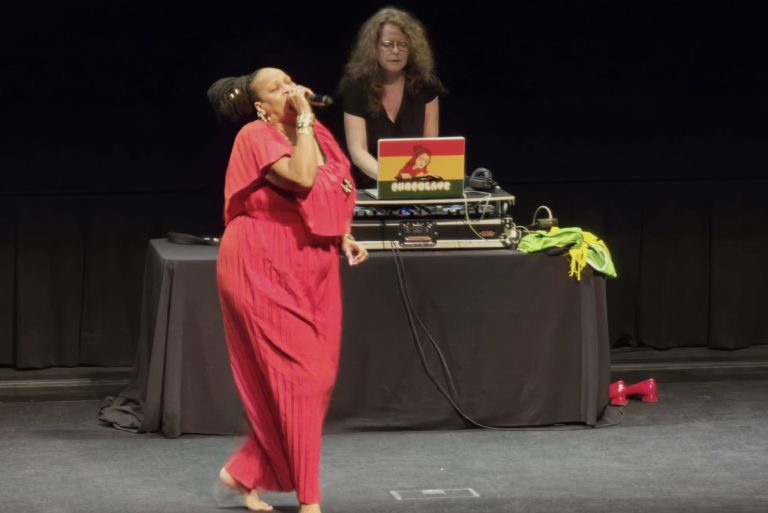Toronto’s reggae community came together last night at the Royal Cinema for the Canadian premiere of “One Two,” the compelling documentary chronicling Sister Nancy’s extraordinary journey from Kingston to global reggae icon. The film, which has already garnered critical acclaim at international festivals, explores how her 1982 hit “Bam Bam” became one of the most sampled reggae songs in history.
As a longtime observer of Toronto’s vibrant music scene, I was struck by the multigenerational crowd that packed the venue. From grey-haired veterans who nodded knowingly during footage of early 1980s Kingston sound systems to young fans discovering reggae’s pioneering women, the audience reflected Toronto’s unique position as a global reggae hub outside Jamaica.
“Sister Nancy broke barriers we didn’t even know existed yet,” said Donna Makeda, founder of Toronto’s Reggae Women’s Collective, who introduced the screening. “Her influence extends far beyond one song—she showed an entire generation that women belonged in the dancehall not just as dancers but as performers commanding respect.”
The documentary reveals Sister Nancy’s remarkable story as Ophlin Russell, growing up with 10 siblings in Kingston before becoming the first female dancehall DJ to tour internationally. Despite recording what would become one of reggae’s most enduring anthems, she received virtually no royalties for decades while living and working as a bank accountant in New Jersey.
After the screening, local artist Tiki Mercury-Clarke led a panel discussion with Toronto-based reggae pioneers including Jay Douglas and Leroy Sibbles, who shared memories of early dancehall culture and Sister Nancy’s boundary-breaking presence.
“What struck me watching this film is how Toronto’s sound developed alongside Kingston’s,” Douglas noted. “When Nancy was recording ‘Bam Bam’ with Techniques, we were building something unique here that borrowed from Jamaica but reflected our Caribbean immigrant experience.”
The film’s co-director, Hali Osuji, flew in from London for the screening and expressed amazement at Toronto’s reggae knowledge. “There’s something special about this city’s connection to Jamaican music. The questions tonight showed a depth of understanding I haven’t encountered elsewhere on our screening tour.”
Indeed, Toronto’s relationship with reggae runs deep. The city hosts North America’s largest reggae festival and has been home to influential artists from Jackie Mittoo to Snow. Local record shops like Trea-Jah Isle and Soundz of the Earth have long served as cultural hubs connecting the diaspora.
For younger attendees, the documentary provided context for “Bam Bam,” which many recognized from samples in songs by Jay-Z, Kanye West, and even Canadian Drake.
“I grew up hearing that beat everywhere but had no idea about Sister Nancy’s story or that she was basically robbed of recognition and payment for decades,” said 23-year-old music production student Aisha Williams. “This film is like reclaiming her place in music history.”
The documentary’s emotional climax comes when Sister Nancy, now in her 60s, finally receives proper recognition and compensation after decades of others profiting from her work. The audience erupted in cheers during footage of her recent performances at major festivals worldwide.
The screening was organized by the Toronto Reggae Collective in partnership with Harbourfront Centre’s “Cultural Pioneers” series. Jane Webster, Harbourfront’s music programming director, told me the response exceeded expectations.
“We initially booked one screening but had to add a second after tickets sold out in 48 hours,” Webster said. “It speaks to Toronto’s deep connection to Caribbean culture and our growing interest in documenting musical pioneers, especially women whose contributions have been undervalued.”
The event also featured a display of vintage reggae memorabilia from the BAND Gallery’s archives, including original vinyl pressings of Sister Nancy’s “One Two” album and posters from her rare Toronto appearances in the 1980s.
Looking around the diverse crowd mingling after the screening, the continuing influence of reggae on Toronto’s cultural identity was unmistakable. From the Jamaican patties served at the reception to the sound system that played classic tracks, the evening celebrated not just Sister Nancy but the ongoing dialogue between Jamaica and its diaspora communities.
“Tonight reminds us why documenting our musical history matters,” said Klive Walker, author of “Dubwise: Reasoning from the Reggae Underground.” “Each generation needs to understand the foundation that made their cultural moment possible. Sister Nancy’s story isn’t just about reggae—it’s about persistence, about women claiming space in male-dominated industries, about diaspora communities maintaining connections across oceans.”
As Toronto continues evolving as a global music center, events like this screening serve as powerful reminders of the cultural threads that have shaped our city’s unique sound and identity.







